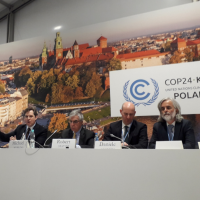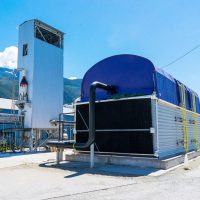Publication Year
2018

The Carbon Footprint of Bitcoin
December 20, 2018
Blockchain has its roots in the cryptocurrency Bitcoin, which was the first successful attempt to validate transactions via a decentralized data protocol. Participation in its validation process requires specialized hardware and vast amounts of electricity, which translate into a significant carbon footprint.

Cooperative approaches under the Paris Agreement discussed at COP 24
December 17, 2018
CEEPR Deputy Director Michael Mehling presented research on the implementation of Article 6 of the Paris Agreement at a COP24 side event.

“Climate change will not wait for usâ€
December 14, 2018
CEEPR graduate students Sruthi Davuluri and Anthony Fratto recently attended the COP24 held in Katowice, Poland. Read about their reflections here.

Rules to boost fuel economy for passenger vehicles will do more good than harm, new study shows
December 6, 2018
A recent paper written by a team of researchers from leading universities, including CEEPR Director Christopher Knittel, has been published in Science today. Read about the conclusions here.

Governing Cooperative Approaches under the Paris Agreement
December 3, 2018
As Parties to the Paris Agreement convene in Poland for COP24, they will be negotiating guidance on the implementation of cooperative approaches, which allow countries to use internationally transferred mitigation outcomes towards their national climate pledges. A new CEEPR Working Paper offers insights from theory and practice to inform the negotiations.

The Rationale for Investment in Life Extension of Spanish Nuclear Power Plants
November 20, 2018
Nuclear power provides more than 20% of Spain’s electricity. As each of the 7 plants approaches its 40 year design life, a decision must be made whether to invest in a life extension, considering Spain’s goal of reducing GHG emissions. This research shows that life extensions are the least-cost alternative for further reducing GHG emissions.

Carbon Capture is Messy and Fraught – But Might Be Essential
October 29, 2018
Who would pay for a company to sequester carbon underground? MIT economist Christopher Knittel discusses a potential solution in a Wired article here.

Dynamic Competition and Arbitrage in Electricity Markets: The Role of Financial Players
October 12, 2018
Market power is typically an important concern in restructured electricity markets. This paper shows that financial traders, who trade alongside physical buyers and sellers, can increase competitiveness and lead to lower consumer prices by effectively competing with generators and restricting their market power.

Carbon tax debate: Nobels and IPCC vs. Trump and Doug Ford
October 9, 2018
In an article in Grist, Professor Christopher Knittel comments on the carbon tax debate. Read the full article here.

Energy Efficiency, Information, and the Acceptability of Rent Increases
September 14, 2018
In this paper, the authors explore role of imperfect information and attentional biases in the context of energy efficiency investments by quantifying how alternative informational interventions affect tenants’ acceptance of rent increases in exchange for improved energy efficiency of their heating appliance.

MIT Energy Initiative study reports on the future of nuclear energy
September 6, 2018
In “The Future of Nuclear Energy in a Carbon-Constrained World,” released by the MIT Energy Initiative on Sept. 3, the authors analyze the reasons for the current global stall of nuclear energy capacity…

Does the U.S. Export Global Warming? Coal Trade and the Shale Gas Boom
September 4, 2018
Christopher Knittel, Konstantinos Metaxoglou, Anson Soderbery and Andre Trindade examine the effect of the US Shale Gas Boom on global trade, consumption of coal, and CO2 emissions and the results show that the total quantity of coal traded around in the absence of the Boom is essentially the same as the actual…

Fair, Equitable, and Efficient Tariffs in the Presence of DERs
August 15, 2018
In a new CEEPR Working Paper, the authors delineate various aspects of equity and fairness that regulators must grapple with when designing electricity tariffs and show that more economically efficient tariffs can improve several aspects of equity. The research argues that DER adoption under existing tariff schemes may increase inequities already present in the power system.

Coordinating Separate Markets for Externalities
July 26, 2018
In a new CEEPR Working Paper, the authors show that inefficiencies from having separate markets to correct an environmental externality are significantly mitigated when firms participate in an integrated product market, using data from an integrated wholesale electricity market.

Who Closes First? Ownership and Collusive Early Exits
July 17, 2018
Climate and energy policies lead to a declining market for the incumbent technologies in electricity markets. Facing the challenge of closures, incumbent firms have incentives to coordinate closures through cross-ownership to achieve a collusive phase-out. For the Nordic nuclear industry, a quantification shows a highly distorted phase-out, both for the consumer surplus and the environment.

Measuring Savings from Fault Detection and Diagnostics
June 4, 2018
Data analytics will play a major role in advancing global energy efficiency and high performance building goals nationally and globally. As the fault detection and diagnostics industry emerges and unlocks numerous energy efficiency savings opportunities in buildings, it is crucial that we also advance our methodologies for evaluating these systems and quantifying the energy impact.

We don’t know what climate change will cost — that doesn’t mean we can ignore it
May 9, 2018
Professor Robert S. Pindyck of MIT and Professor James H. Stock of Harvard University discuss the importance of the social cost of carbon in a new piece on TheHill.

Electricity Market Design with Renewables
May 1, 2018
A new paper compares EU and US electricity market designs, arguing for a focus on correct price formation in the short-term to incentivize investments and reliability. Increased demand-side participation, improved pricing during scarcity, and a transition from technology-specific renewables subsidies towards adequate pricing of carbon emissions, are key to achieving a market-compatible integration of renewable energy.

Restructuring Revisited: Competition and Coordination in Electricity Distribution Systems
March 20, 2018
In light of the decentralization of the power sector, a new CEEPR Working Paper carefully considers how industry structure regulations impacts competition, market development, and the efficiency of investments in and operations of network infrastructure and connected resources.

Power Sector Reform and Corruption: Evidence from Sub-Saharan Africa
March 7, 2018
In this paper, the authors conduct an econometric analysis of the performance of reforms in terms of efficiency, welfare, and economic development in 47 countries in Sub-Saharan Africa between 2002 and 2013.

3 Questions: The Future of Nuclear Energy
February 21, 2018
Jacopo Buongiorno and John Parsons, co-directors of the MITEI LCEC for Advanced Nuclear Energy Systems, discuss how to overcome the challenges and realize the benefits of expanding nuclear power.

Reforming Electricity Markets for the Transition: Emerging Lessons from the UK’s Bold Experiment
February 7, 2018
In 2013, the UK introduced radical market reform to meet the new challenges – a change which some critics denounced as a return to central planning, whilst others feared the costs. The results to date suggest that EMR is a step forwards, not backwards; but it is not the end of the story.

3 Questions: Transforming our Electric Power System
February 2, 2018
Christopher Knittel and Francis O’Sullivan, co-directors of the MITEI LCEC for Electric Power Systems Research, are exploring cleaner, more reliable, and more cost-effective solutions.

Is Massachusetts ready for carbon pricing?
January 30, 2018
On Jan. 25, a panel at MIT explored the benefits, costs, and political challenges involved in translating carbon pricing from concept into law in Massachusetts and beyond.

Jing Li: Applying economics to energy technology
January 30, 2018
Soon-to-be assistant professor of applied economics focuses on development and deployment solutions that can help the world move to a low-carbon future.

Subsidizing Fuel Efficient Cars: Evidence from China’s Automobile Industry
January 29, 2018
In a new CEEPR Working Paper, the authors examine the response of vehicle purchase behavior to China’s largest national subsidy program for fuel efficient vehicles during 2010 and 2011.

The Use of Regression Statistics to Analyze Imperfect Pricing Policies
January 24, 2018
Corrective taxes can completely solve a variety of market failures, but actual policies are commonly forced to deviate from the theoretical ideal due to administrative or political constraints. A new CEEPR Working Paper presents a method that requires a minimum of market information to quantify the costs of imperfect pricing, using simple regression statistics.

A Sector in Transition: Transportation in the 21st Century
January 10, 2018
MIT CEEPR, together with the Baker Institute, will host experts for a discussion focusing on the future of transportation. Registration is now open, please find details within.

What’s Killing Nuclear Power in U.S. Electricity Markets?
January 4, 2018
Prices in U.S. electricity markets fell precipitously in recent years, driving several nuclear power plants to announce plans to close well before the end of their licensed operation. A new working paper provides the first empirical estimate of the geographically heterogeneous impact of three factors on the decline in market prices earned by nuclear plants in the PJM Interconnection between 2008-2016.




